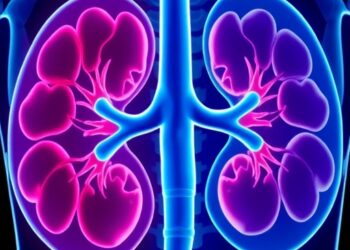Monday, June 10, 2024, CLEVELAND: Cleveland Clinic researchers have discovered a new location for a protein that helps ovarian cancer cells resist chemotherapy treatments and that fosters aggressive cancer stem cell growth.
Monday, June 10, 2024, CLEVELAND: Cleveland Clinic researchers have discovered a new location for a protein that helps ovarian cancer cells resist chemotherapy treatments and that fosters aggressive cancer stem cell growth.
These findings, published today in Molecular Cancer, may become the basis of a new approach to treat chemotherapy-resistant ovarian cancer that targets the protein CD55. Currently the CD55 protein is difficult to target because of its protective role in the immune system and its location on the cell surface.
Ofer Reizes, Ph.D., the Laura J. Fogarty Endowed Chair for Uterine Cancer Research at Cleveland Clinic’s Lerner Research Institute, and his lab previously identified CD55 as a driver of ovarian cancer chemoresistance. They also found CD55 underlies tumor recurrence and metastasis, findings replicated in additional cancers. Collectively, the previous studies indicated CD55 may provide a way to treat ovarian cancer, and his group has worked to determine how such a treatment would work.
The breakthrough came as Drs. Rashmi Bharti and Goutam Dey, post-doctoral fellows in Dr. Reizes’ lab, found that CD55 migrated into the cell nucleus from the surface, a location in which this protein has never been found before.
The lab started examining cells and tissues from patient samples by working with Chad Michener, M.D., and Roberto Vargas, M.D., oncologists specializing in women’s health at Cleveland Clinic. A subset of patient tumors showed the same thing: the CD55 protein was inside the nucleus of the cancer cells and setting off a response that makes the cancer more aggressive.
“Cancer cells can do unusual things ‒ co-opt existing pathways and create new pathways we didn’t know were possible,” Dr. Reizes said. “Once we discovered this new pathway, we wanted to see if we could find a way to block CD55 from moving into the nucleus. And then, once we prevented that move from occurring, we needed to determine whether we could halt the cancer’s progression.”
The study showed blocking CD55’s migration from the cell surface to the nucleus disrupted cancer growth and lessened the cell’s resistance to chemotherapy.
Ovarian cancer is the second most common gynecologic cancer in the U.S. and the most common cause of death. The disease’s vague symptoms often lead to late-stage diagnosis, complicating treatment. Gynecologic cancer patients commonly see the cancer recur and develop resistance to chemotherapy. Ovarian cancer cells ‒ especially cancer stem cells ‒ can survive chemotherapy drugs. Dr. Reizes’ lab investigates chemoresistance biomarkers and targeted therapies.
Ovarian cancer treatment often involves waiting for one treatment to fail before trying something new. This study’s findings may allow doctors and patients to decide to avoid chemotherapy if CD55 is already present in the cell nucleus. With the knowledge from the current findings, the lab is investigating therapeutic approaches including peptide-based, small molecule drugs and antibodies to stop CD55 from migrating to the nucleus. Moreover, the Reizes team, in collaboration with Drs. Michener and Vargas, is validating nuclear CD55 as a chemoresistance marker in gynecologic cancers as well as other solid tumors.
“These newly identified markers could allow us to track these cancers as they change in real-time,” Dr. Vargas said. “How amazing would it be to adapt our treatments as a tumor is evolving, instead of waiting for negative results months later? These approaches, thanks to Dr. Reizes’ findings, may finally allow us to remain a step ahead.”
Journal
Molecular Cancer
Subject of Research
People
Article Title
Cleveland Clinic Research Findings May Lead to Improved Treatments for Chemotherapy-Resistant Ovarian Cancer
Article Publication Date
10-Jun-2024
COI Statement
None




